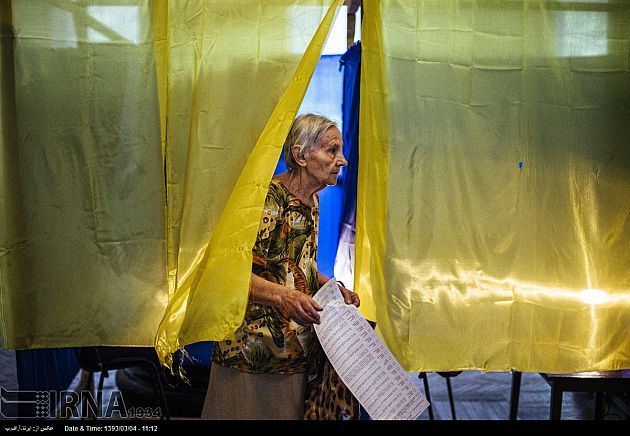Russia’s Ongoing Role in Ukraine

The first parliamentary elections since the February revolution in Ukraine have been held. It is now said that the parties which have western inclinations are dominant in the parliament. What effects could the presence of this movement in the parliament have on the future of Ukrainian developments, particularly in the eastern regions?
The parliament was one of the scenes of disputes between the western-inclined and Russia-inclined movements during previous periods. Therefore, parliamentary elections have always been tumultuous. Considering the fact that in the past the competition between these two parties was close, these elections have always been significant. But this time, due to the existence of the crisis and the separation of Crimea and then parts of eastern Ukraine, the inhabitants of these regions were not able to enter into the process of elections and limited parties which are still inclined towards Russia could not gain more votes. It is said that only one of the parties which supports Yanukovych has acquired 8% of the votes which would not naturally be able to impact the future of this country. Thus, it seems that the western-oriented movements which are interested in their country’s presence in Europe have the upper hand in the parliament. On the other hand, other issues such as the economy would cause different views to be formed in the parliament. The Solidarity Party which is affiliated with Poroshenko has been able to gain the majority of votes and it is predicted that this party is the frontrunner in the independent votes as well but it could not solely gain the absolute majority of the parliament, hence, it would have to form a coalition with the People’s Front party led by Arseniy Yatsenyuk, the current prime minister, in order to establish the government.
At the present time, Ukraine is faced with economic challenges and also the gas crisis because Russia has threatened to cut off the gas. Would the western-oriented parliament be able to improve the economic conditions of this country?
One of the most important problems and challenges of the new government and parliament is the management of the economic situation; a situation which, following the crises in the eastern parts, created challenges for the country’s industry and even the separation of the major parts and ultimately damaging the economy. Right now, parts of the government expenses should be spent for military and defense issues. Ukraine’s only hope is aid which might be given by the western countries so that it would be able to pass through this time and be hopeful of economic growth in the coming years. But one of the problems of the new government is the type of relations with Russia which are divided in different dimensions. One of these dimensions is related to the separatist challenges in the east of Ukraine in which Russia would be very effective. In fact, the interaction with Russia could impact the future of these regions. On the other hand, the issue of providing gas would be another challenge in the winter. It is predicted that Russia will increase its pressure on Ukraine in the area of energy this winter and use this opportunity to pursue its own policies. At the present time, the Russians have stated that considering the bad precedence left by Ukraine in their payments, they should now pre-pay the cost of gas. Talks still continue in this regard but have not reached a conclusion. Therefore, experts predict that Russia will leave Ukraine without gas in the cold weather. Thus, part of Ukraine’s economy has been dependent and affected by its cooperation with Russia. These elements could impact the new government and parliament.
It is said that three million people in two eastern provinces and about 2 million inhabitants of Crimea did not participate in the elections. In fact, almost 5 million people were not present in the elections. What impacts could the absence of these people have on the political future of Ukraine?
Their plan is to hold separate elections in the eastern regions. This means that the trend of separation of the eastern regions, which began after the separation of Crimea, is stabilizing. I believe that this election would confirm the separation of the eastern regions and we practically see that these regions are separated from the process of playing roles in the central government. Therefore, if the conditions change, they will no longer be able to affect the government of Ukraine because at least for a four-year period the western-oriented majority in the parliament will impact the central government. That is why the Russia-oriented movements will not be able to impact the future Ukrainian government.
Does the new parliament have the necessary capacity and power to return the regions which have been separated from Ukraine through the adoption of laws or cooperation with international institutions?
This issue is more related to the government than the parliament. Nonetheless, the type of government that would be chosen and also the interactions of the new parliament through the adoption of laws could impact the outcome of the crisis. It is not clear what the outcome of this crisis would be but it will certainly have effects. On the other hand, the laws which could bring Ukraine closer to the West could also cause Russia’s negative reactions. Thus, it seems impossible that the parliament would be able to affect the annexation of the separated regions and for this issue to be resolved through the adoption of laws. This issue would be solved within the framework of the interactions of the central government with Russia or military measures. Of course, the Ukrainians themselves are not hopeful about resolving this issue through military and even political measures in the short run to convince the Russians to stop their support of the separatists in eastern Ukraine.

